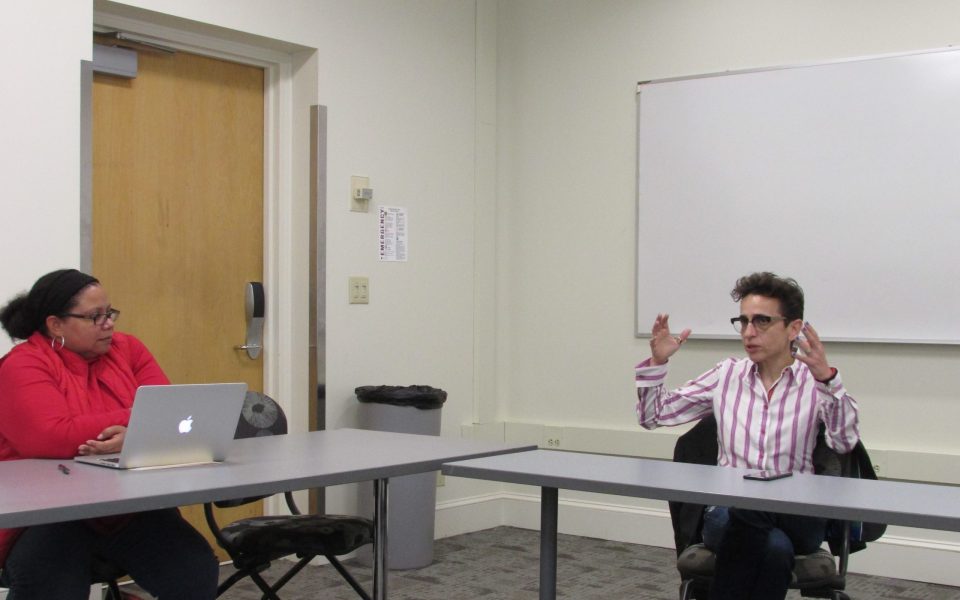With horn-rimmed glasses, fingernails painted with blue polish, a tousled pompadour, boots, blue jeans and a pinstriped shirt, Masha Gessen projects intellectual intensity or maybe the lean, hungry look of a member of the English political punk band the Clash in the early 1980s.
Gessen, an opposition journalist in Russia who was forced to flee the country in 2013 because of anti-gay persecution, emerged after the 2016 election with a series of devastating essays in the New York Review of Books warning with Cassandra-like urgency about the dangers of creeping authoritarianism in the United States.
Having witnessed Russia revert to totalitarianism, Gessen suggested in a piece published two days before Christmas 2016 that Donald Trump is an eager disciple of Vladimir Putin’s effort to master reality by lying with impunity.
“It’s not just that Putin and Trump lie, it’s that they lie in the same way and for the same purpose: blatantly, to assert power over truth itself,” Gessen wrote. “Take, for example, Putin’s statements on Ukraine. In March 2014, he claimed that there were no Russian troops in newly annexed Crimea; a month later he affirmed that Russian troops had been on the ground. Throughout 2014 and 2015, he repeatedly denied that Russian troops were fighting in eastern Ukraine; in 2016 he easily acknowledged that they were there. In each case, Putin insisted on lying in the face of clear and convincing evidence to the contrary; and in each case his subsequent shift to truthful statement were not admissions given under duress; they were proud, even boastful affirmatives made at his convenience. Together, they communicated a single message: Putin’s power lies in being able to say what he wants, when he wants, regardless of the facts. He is the president of his country and the king of reality.”
Around the same time, Gessen told journalist Fernanda Eberstadt for a piece in Salon: “The only thing we can do is the exact opposite of what Germans, Poles and Hungarians did, which is wait and see. We must panic and protest, presumptively assume the worst.”
Seated in the middle of a semicircle of faculty and students in a classroom on the second floor of Tribble Hall at Wake Forest University on Monday, Gessen surprises me with her unperturbed response to my question about whether US civil society will be able to reclaim reality in the face of right-wing internet trolls constantly manufacturing hoaxes to promote division.
“Humanity has certainly lived through darker times than we’re in now,” she deadpans.
“We have to be careful of conspiracy thinking,” Gessen adds. “We’re not doing great with that on the left either.”
She’s lost some fans with her thesis on left-wing blind spots, aptly summarized in the headline of a recent column posted on the New Yorker website on Nov. 3: “Russian interference in the 2016 election: a cacophony, not a conspiracy.”
She elaborates for the benefit of the faculty and students at Wake: “There’s no evidence that Russia tried to influence the election. Once there’s evidence I’ll buy it…. There’s plenty of evidence that they were trying to mess with us, but no evidence that they were trying to throw the election to Trump.”
As evidence that Russia did not attempt to influence the election, Gessen says Putin was as surprised as anyone else that Trump won and notes that the Russian president organized a conference outside of Sochi in October 2016 at which he invited people who could be expected to hold influence over national security issues in a pending Clinton administration.
“The whole conference featured Putin speaking to them about how the Kremlin was going to cooperate with the Clinton administration,” she says. “That’s the level at which they were addressing the probable outcome of the election.”
There’s a fascinating sidebar explored in Gessen’s Nov. 3 New Yorker column: Multiple Russian media outlets have written about a “troll factory” in St. Petersburg with a budget of $2.2 million and 800 to 900 employees — 10 percent of them assigned to make mischief on American social media feeds. In Charlotte, a Russian-created website called BlackMattersUS even scheduled a protest to decry the police-involved shooting of Keith Lamont Scott in October 2016, and persuaded Conrad James, a local activist, to organize it. It drew 300-400 people. “The trolls’ job was not so much to aid a particular presidential candidate,” Gessen wrote, “as to wreak havoc by posting on controversial subjects.”
The truth is right in front of us, Gessen says during the meeting at Wake. We don’t have to uncover secrets.
“My argument is for engaging with truth rather than secrets,” she says. “Truth is like the decimation of the State Department that’s happened right before our eyes. It’s the deregulation. It’s the nuclear brinksmanship. That stuff does not require investigative powers and connecting the dots because it’s right there, and it’s destroying this country as we speak.”
Join the First Amendment Society, a membership that goes directly to funding TCB‘s newsroom.
We believe that reporting can save the world.
The TCB First Amendment Society recognizes the vital role of a free, unfettered press with a bundling of local experiences designed to build community, and unique engagements with our newsroom that will help you understand, and shape, local journalism’s critical role in uplifting the people in our cities.
All revenue goes directly into the newsroom as reporters’ salaries and freelance commissions.


Leave a Reply